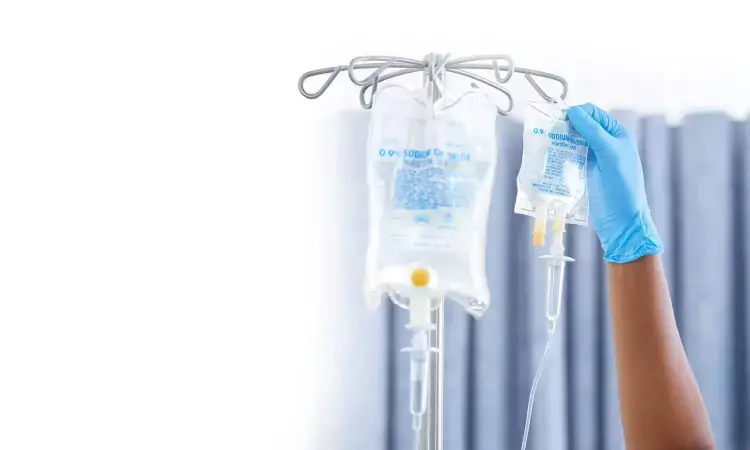- Home
- Medical news & Guidelines
- Anesthesiology
- Cardiology and CTVS
- Critical Care
- Dentistry
- Dermatology
- Diabetes and Endocrinology
- ENT
- Gastroenterology
- Medicine
- Nephrology
- Neurology
- Obstretics-Gynaecology
- Oncology
- Ophthalmology
- Orthopaedics
- Pediatrics-Neonatology
- Psychiatry
- Pulmonology
- Radiology
- Surgery
- Urology
- Laboratory Medicine
- Diet
- Nursing
- Paramedical
- Physiotherapy
- Health news
- Fact Check
- Bone Health Fact Check
- Brain Health Fact Check
- Cancer Related Fact Check
- Child Care Fact Check
- Dental and oral health fact check
- Diabetes and metabolic health fact check
- Diet and Nutrition Fact Check
- Eye and ENT Care Fact Check
- Fitness fact check
- Gut health fact check
- Heart health fact check
- Kidney health fact check
- Medical education fact check
- Men's health fact check
- Respiratory fact check
- Skin and hair care fact check
- Vaccine and Immunization fact check
- Women's health fact check
- AYUSH
- State News
- Andaman and Nicobar Islands
- Andhra Pradesh
- Arunachal Pradesh
- Assam
- Bihar
- Chandigarh
- Chattisgarh
- Dadra and Nagar Haveli
- Daman and Diu
- Delhi
- Goa
- Gujarat
- Haryana
- Himachal Pradesh
- Jammu & Kashmir
- Jharkhand
- Karnataka
- Kerala
- Ladakh
- Lakshadweep
- Madhya Pradesh
- Maharashtra
- Manipur
- Meghalaya
- Mizoram
- Nagaland
- Odisha
- Puducherry
- Punjab
- Rajasthan
- Sikkim
- Tamil Nadu
- Telangana
- Tripura
- Uttar Pradesh
- Uttrakhand
- West Bengal
- Medical Education
- Industry
Enteral protein delivery does not improve outcome in critically ill patients: JAMA

A new study published in the Journal of American Medical Association showed that supplementing enteral protein during critical illness did not increase the number of days spent outside of the index hospital and surviving at day 90.
Guidelines indicate supplementing enteral protein during critical illness, however the effect on patient outcomes is unknown. As a result, Matthew Summers and colleagues assessed whether supplementing enteral protein increases days alive and free of hospitalization.
From May 23, 2022, to August 23, 2023, 8 ICUs in Australia and New Zealand provided critically ill patients receiving enteral nutrition for this study. The last follow-up was conducted on November 21, 2023. A comparison was made between two isocaloric enteral formulae: normal protein (63 g protein/L) and boosted protein (100 g protein/L). Over the course of 12 months, ICUs employed formulas in succession for 3 months; 4 ICUs started with increased protein, and 4 ICUs started with regular protein.
The number of days that the patient was alive at day 90 and not admitted to the index hospital was the main outcome. The length of invasive ventilation, intensive care unit, and hospitalization; the incidence of tracheostomy insertion and new renal replacement treatment; the destination of hospital release; and the number of days that survivors were free of the index hospital on day 90 were all examples of secondary outcomes.
There were 3,397 patients in all, with a median age of 61 [IQR 48–71] years with 64% of them being male. There was no significant difference between the high-protein group and the standard-protein group at day 90, with the median number of days alive and out of the hospital being 62 (IQR 0–77) and 64 (IQR 0–77), respectively (median difference −1.97 days; 95% CI, −7.24 to 3.30; P =.46).
At day 90, the normal group's survival rate was 74.0%, whereas the high-protein group's was 72.6% (risk ratio 0.99; 95% CI, 0.95–1.03). Hospital-free days (0.01; 95% CI, −1.94 to 1.96), ventilation time (6.8 hours; 95% CI, −3.0 to 16.5), discharge risks (hospital HR 0.96; ICU HR 0.93), tracheostomy, and new renal treatment (RR 0.97) were the secondary outcomes that exhibited the least amount of variation. Each group's discharge locations were comparable.
Overall, when compared to standard treatment, increasing enteral protein supply in critically sick patients did not result in more days spent alive at day 90 and free of the index hospital. Enteral protein supplementation during severe illness is not supported by these results.
Source:
Summers, M. J., Chapple, L.-A. S., Karahalios, A., Bellomo, R., Chapman, M. J., Ferrie, S., Finnis, M. E., French, C., Hurford, S., Kakho, N., Maiden, M. J., O’Connor, S. N., Peake, S. L., Presneill, J. J., Ridley, E. J., Tran-Duy, A., Williams, P. J., Young, P. J., Zaloumis, S., … TARGET Protein Investigators and for the Australian and New Zealand Intensive Care Society Clinical Trials Group. (2025). Augmented enteral protein during critical illness: The TARGET protein randomized clinical trial. JAMA: The Journal of the American Medical Association. https://doi.org/10.1001/jama.2025.9110
Neuroscience Masters graduate
Jacinthlyn Sylvia, a Neuroscience Master's graduate from Chennai has worked extensively in deciphering the neurobiology of cognition and motor control in aging. She also has spread-out exposure to Neurosurgery from her Bachelor’s. She is currently involved in active Neuro-Oncology research. She is an upcoming neuroscientist with a fiery passion for writing. Her news cover at Medical Dialogues feature recent discoveries and updates from the healthcare and biomedical research fields. She can be reached at editorial@medicaldialogues.in
Dr Kamal Kant Kohli-MBBS, DTCD- a chest specialist with more than 30 years of practice and a flair for writing clinical articles, Dr Kamal Kant Kohli joined Medical Dialogues as a Chief Editor of Medical News. Besides writing articles, as an editor, he proofreads and verifies all the medical content published on Medical Dialogues including those coming from journals, studies,medical conferences,guidelines etc. Email: drkohli@medicaldialogues.in. Contact no. 011-43720751


